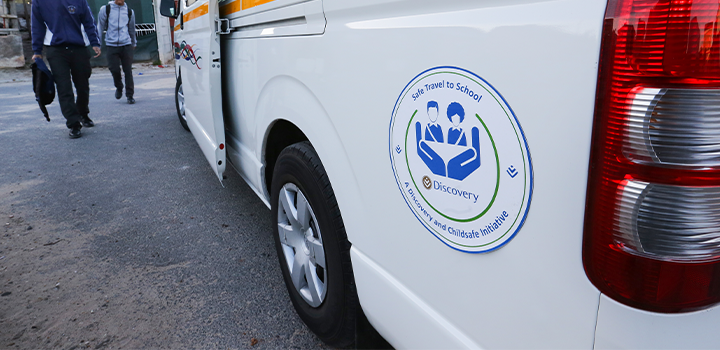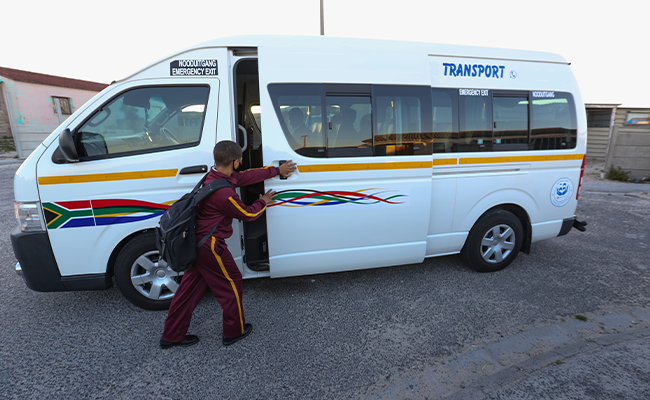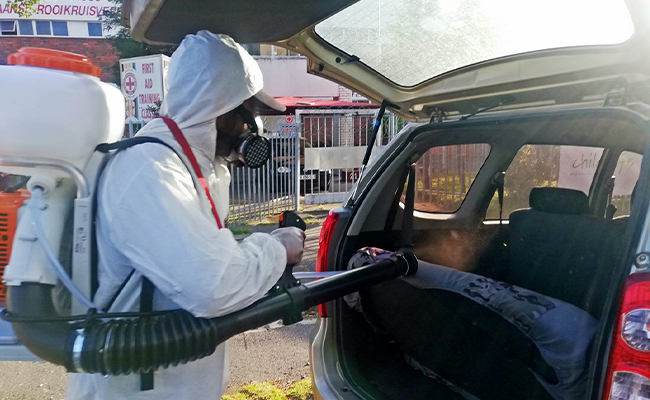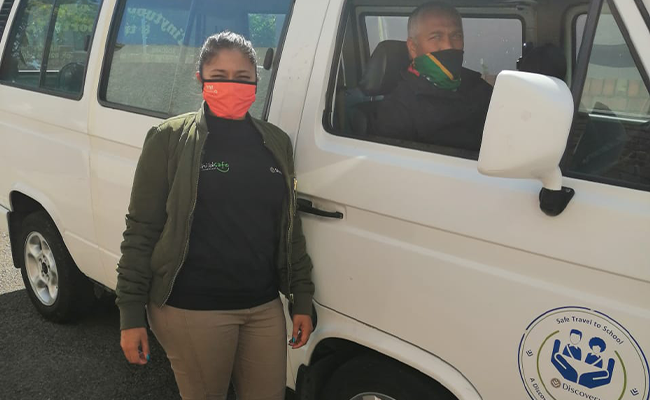Safe Travel to School helps scholar drivers navigate COVID-19

In the Western Cape, scholar drivers transport over 80 000 children to and from school every day. Find out how Safe Travel to School, a collaboration between Discovery and Childsafe, gave the drivers on its programme protection from COVID-19.
The Safe Travel to School project – an initiative Discovery and Childsafe launched in 2014 to create safer transport for children to travel to school – has been instrumental in reducing the number of child fatalities on the road. In 2020, the programme has 955 drivers transporting over 18 000 learners to and from school – with not a single recorded injury or death since it began.
But 2020 has also disrupted and posed new challenges for the scholar drivers taking part in the Safe Travel to School project.

The Safe Travel to School project empowers scholar drivers to transport learners to and from school safely every day.
COVID-19 left scholar drivers in a bind
On 5 March 2020, Minister of Health Dr Zweli Mkhize announced that COVID-19 had reached South Africa. “On that morning, the Safe Travel to School team was getting ready for the remaining motor vehicle tracking device installations sessions for the first quarter of 2020,” says Marcella Naidoo, Safe Travel to School project manager. “But by 14 March, it became evident that it would not be business as usual.”
Marcella was right. On 18 March, all Western Cape schools closed, which left about 3 200 scholar drivers without an income. “It was clear to us that this decision would impact heavily on the livelihoods of the 1 000 scholar drivers who participated in the programme over the past five years,” Marcella continues. “After the first month of lockdown, with schools closed and drivers not driving, they began to feel the financial stress of not receiving an income.”
Drivers were out of work from March to August. When schools did open again, the opening followed a staggered approach, which reduced the demand for scholar drivers. “Many drivers left the project to find other sources of income,” Marcella adds. A lower demand and lack of income meant that many drivers decided to sell their vehicles rather than risk not making the financing payments and then losing everything.
Safe Travel to School incentivises and rewards drivers’ behaviour
During regular school years, Safe Travel to School, which is based in the Western Cape, incentivises and rewards scholar drivers for improving their driving behaviour. The programme uses advanced driving technology and Vitality Drive’s behavioural change model to track and improve drivers’ performance in speeding, accelerating, braking, cornering and driving without using a cellphone.
Every Safe Travel to School driver gets a DQ-Track in their vehicle, which helps drivers to track and improve their driving and safety awareness. The drivers with the highest scores and who have met project requirements stand to earn substantial quarterly and yearly rewards, supported by the Discovery Fund. Drivers also receive additional support in the form of defensive-driving courses, an eye test, a basic health check and referral to local clinics, and first-aid training.
- Read more about Safe Travel to School
With road injuries remaining a major concern worldwide, the Safe Travel to School project aims to help achieve road safety. In February 2020, the World Health Organization reported that road traffic injuries are the leading cause of death for children and young adults age five to 29 years, with road traffic accidents claiming 1.35 million lives every year.
Supporting scholar drivers in the new normal
When schools opened again in June, scholar drivers had to sanitise their vehicles and comply with COVID-19 hygiene regulations – despite the fact that they had been out of work since March. Safe Travel to School stepped in to keep the participating drivers and learners safe from COVID-19.

The South African Red Cross Society helps to sanitise scholar drivers’ vehicles to comply with COVID-19 regulations.
“During July, we reallocated a part of our budget to give personal protective equipment packs to drivers,” Marcella explains. “We were careful to follow all COVID-19 regulations and distributed 521 packs, containing two reusable fabric face masks, hand sanitiser, disinfectant for the vehicle, a book to track the children, and information on how to deal with ill children.”
From mid-August 2020, the programme started installing DQ-Tracks in scholar drivers’ vehicles again, following COVID-19 regulations. “Childsafe reorganised how we do installations. Before the pandemic, 15 to 20 drivers would come for an installation at a time. Now, we follow a relay format, with five drivers every hour,” Marcella explains. During these installations, the South Africa Red Cross Society helps to sanitise the drivers’ vehicles.

Safe Travel to School staff member, Lee-Che Krieger (Left) and scholar driver, Richard Swartz (Right).
It’s not business as usual yet, but at the beginning of October 2020, scholar drivers could start going for first-aid and defensive-driving training again. St John, a non-profit organisation in Cape Town, is the service provider doing eye tests for 565 scholar drivers on the programme.
Safe Travel to School invites all scholar drivers with a valid public driving permit and operating licence to join its network.
For more information or to apply to take part in the project, visit Childsafe.org.za, call 021 685 5208 or email info@childsafe.org.za.
Join the Safe Travel to School project and keep children safe from injuries
Safe Travel to School is a project of Discovery and Childsafe, an NGO that works with the trauma unit of the Red Cross War Memorial Children’s Hospital in Athlone and Rondebosch.
Safe Travel to School aims to prevent injury to or death of scholars through motor vehicle crashes as scholars travel to and from school each day. The project focuses on improving scholar drivers’ driving behaviour and encourages them to provide safe and reliable transport for school learners.
If a scholar driver wants to take part in the project, they need a valid public driving permit (PDP) and an operating licence if they own the vehicle that they use to transport scholars to and from school. Drivers will also have to commit time to take part in project activities such as free first-aid and defensive-driver training sessions.
Related articles
High-tech child-transport collaboration saves lives
A globally-unique collaboration between Discovery and a paediatrician-initiated child safety NGO is making dramatic inroads on vehicle related trauma and mortality in the Western Cape.
Discovery drivers are improving SA's road stats
South African roads are among the most dangerous in the world, with almost 90% of accidents caused by bad driving. But Discovery drivers are improving these stats, one behaviour change at a time.
Which car seat is best for your child? Here's a breakdown
Using the correct car seat for your child will go a long way towards their safety and your peace of mind. Learn what kind of car seat your child needs and when to upgrade them here.